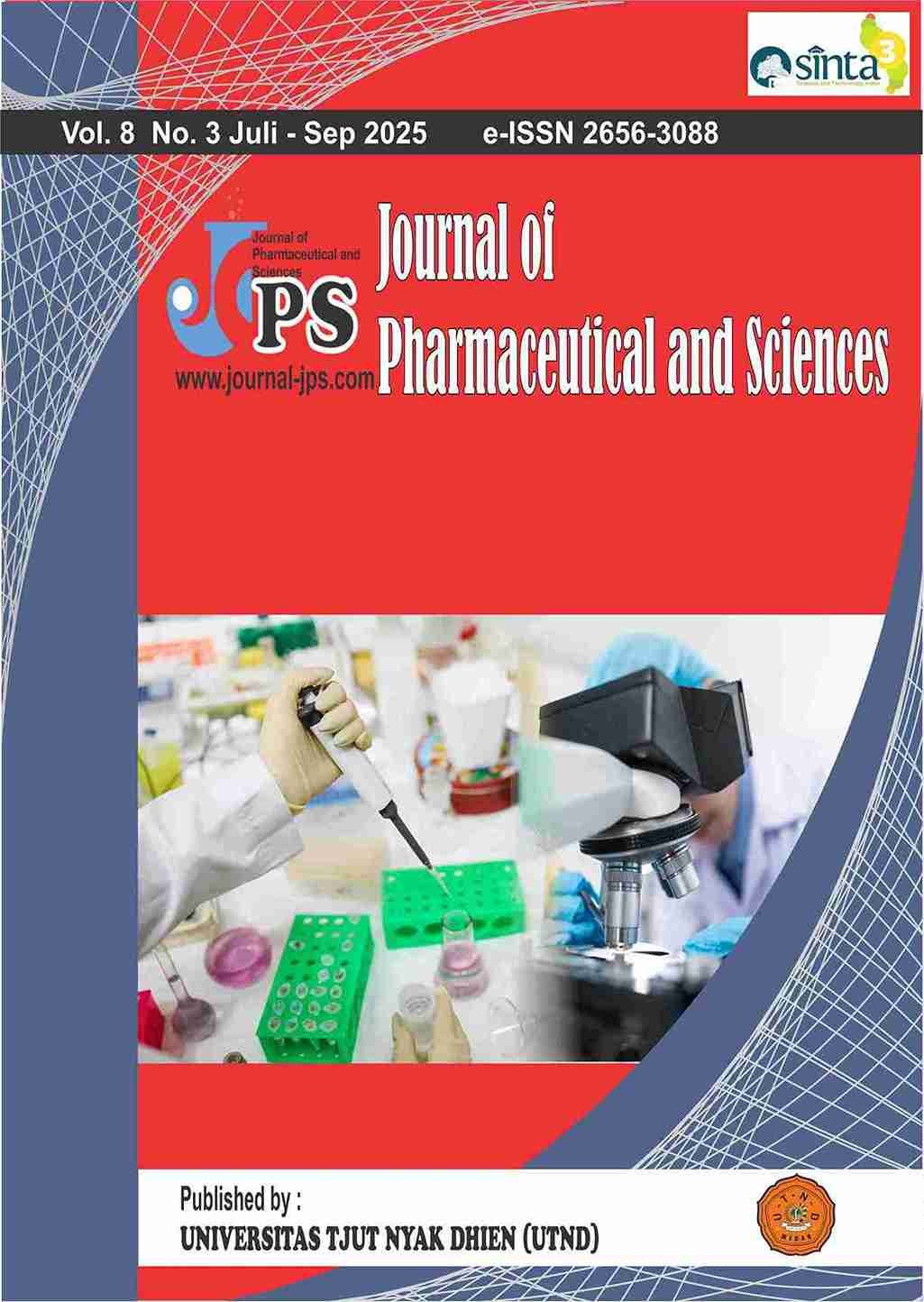Relationship of Family Support and Mother's Psychology with the Success Rate of Exclusive Breastfeeding in Paya Geli Village
Main Article Content
Page: 2027-2037
Abstract
Background: Breast milk (ASI) is the ideal source of nutrition, containing antibodies and bioactive substances that support infant growth, development, and immune function. Despite its substantial benefits, many mothers fail to exclusively breastfeed. Family support and maternal psychological conditions are strongly suspected to influence the success of exclusive breastfeeding. Objective: This study aims to analyze the relationship between family support and maternal psychological conditions with the success of exclusive breastfeeding in Paya Geli Village. Methods: This quantitative study employed a cross-sectional design involving 32 mothers with infants aged 0–6 months. Data were collected using questionnaires and analyzed through univariate and bivariate analyses with Chi-Square and Fisher’s Exact tests. Results: Analysis of this limited sample showed a statistically significant association between family support (OR = 106.8; 95% CI: 10.0–1149.0; p < 0.001) and maternal psychological conditions (OR = 53.3; 95% CI: 2.7–1046.6; p = 0.0003) with exclusive breastfeeding success. However, the wide confidence intervals (CIs) indicate considerable uncertainty in the estimates. Conclusion: Family support and maternal psychological conditions are critical determinants of exclusive breastfeeding success. Community-level health promotion programs should prioritize these factors to improve exclusive breastfeeding coverage. Policy implications warrant further investigation with larger and more representative samples.
Downloads
Article Details

This work is licensed under a Creative Commons Attribution-NonCommercial-ShareAlike 4.0 International License.
References
Herman A, Chalifa WO. Hubungan Pengetahuan dan Sikap Ibu dengan Pemberian ASI Eksklusif. Prof Heal J 2021;2:84–9. DOI: https://doi.org/10.54832/phj.v2i2.103
Hartati S, Sukarni; Hubungan Pengetahuan dan Sikap Ibu dengan Pemberian ASI Eksklusif di Desa Pasar Banjit Wilayah Kerja Puskesmas Banjit Way Kanan Tahun 2017. J Gizi Aisyah 2019;2:56–64.
Audia MS, Lestari W, Sari NY. Faktor-Faktor Yang Mempengaruhi Ibu Dalam Memberikan ASI Eksklusif: Literatur Review. J Ilmu Kesehat Dan Keperawatan 2023;1:1–16. DOI: https://doi.org/10.59581/diagnosa-widyakarya.v1i3.834
WHO. Pemberian makanan pada bayi dan anak kecil. World Heal Organ 2023.
Permanasari I, Erlani J, Fadli R, Sari YP, Rahayu AOS. Pengetahuan Ibu Dan Dukungan Keluarga Berkontribusi Terhadap Keberhasilan Pemberian Asi Esklusif. Al-Asalmiya Nurs J Ilmu Keperawatan (Journal Nurs Sci 2021;10:78–87. DOI: https://doi.org/10.35328/keperawatan.v10i2.2085
Kementerian Kesehatan Republik Indonesia. Profil Kesehatan Indonesia 2023. Jakarta: 2024.
Indonesia KR. Profil kesehatan Indonesia tahun 2016. Jakarta KEMENKES RI 2017.
Badan Pusat Statistik. Persentase Bayi Usia Kurang Dari 6 Bulan Yang Mendapatkan Asi Eksklusif Menurut Provinsi (Persen), 2024. Badan Pus Stat 2024. https://www.bps.go.id/id/statistics-table/2/MTM0MCMy/persentase-bayi-usia-kurang-dari-6-bulan-yang-mendapatkan-asi-eksklusif-menurut-provinsi.html.
Jannah M. Hubungan Pengetahuan, Pekerjaan Ibu, Dan Status Ekonomi Dengan Pemberian ASI Eksklusif. J Kesehat Terap 2021;8:14–24.
Sulastri, Sri Mintarsih, Ulfi Kartika Sari. Hubungan Antara Dukungan Keluarga Dengan Pemberian ASI Esklusif. J Ilm Kedokt Dan Kesehat 2022;1:92–7. https://doi.org/10.55606/klinik.v1i2.713. DOI: https://doi.org/10.55606/klinik.v1i2.713
Dewi RR, Ardian J, Lastyana W. Hubungan Dukungan Keluarga dengan Pemberian ASI Ekslusif pada Bayi Usia 0-6 Bulan. Nutr J Pangan, Gizi, Kesehat 2023;4:39–44. DOI: https://doi.org/10.30812/nutriology.v4i2.3251
Saraha RH, Umanailo R. Faktor-Faktor Yang Berhubungan Dengan Keberhasilan ASI Eksklusif Relating Factors to the Success of Exclusive Breastfeeding. J Kesehat Poltekkes Kemenkes RI Pangkalpinang 2020;8:27–36. DOI: https://doi.org/10.32922/jkp.v8i1.128
Assriyah H, Thaha AR, Jafar N. Hubungan pengetahuan, sikap, umur, Pendidikan, pekerjaan, psikologis, dan inisiasi menyusui dini dengan pemberian ASI eksklusif di Puskesmas Sudiang. J Gizi Masy Indones (The J Indones Community Nutr 2020;9. DOI: https://doi.org/10.30597/jgmi.v9i1.10156
Sugiyono. Metodologi Penelitian Kuantitatif Kualitatif dan R&D. Bandung: Alfabeta; 2019.
Rosida DAC, Nuraini I, Rihardini T. Usaha untuk Meningkatkan Cakupan ASI Eksklusif dengan Pendekatan Emotional Demonstration “ASI Saja Cukup.” Dedication J Pengabdi Masy 2020;4:25–32. DOI: https://doi.org/10.31537/dedication.v4i1.290
MCRP1 JHEF, Prasetyo B, Etika R, Lestari4 P. Pengaruh Dukungan Keluarga dan Psikologis Ibu terhadap Pemberian ASI Eksklusif : Effects of Family Support and Maternal Psychology on Exclusive Breastfeeding n.d.
Pakilaran G, Rasni H, Nur KRM, Wijaya D. Family Support on Exclusive Breastfeeding in Babies Aged 0-6 Months in Indonesia: Literature Review. Nurs Heal Sci J 2022;2:104–7. https://doi.org/10.53713/nhs.v2i2.53. DOI: https://doi.org/10.53713/nhs.v2i2.53
Li F, Huang C, Lin Q, Xi Y, Xiang C, Yong C, et al. Maternal Characteristics, Intention, Self-Efficacy, Perceived Social Support, and Exclusive Breastfeeding Practice: Structural Equation Modeling Approaches. Healthcare 2022;11:87. https://doi.org/10.3390/healthcare11010087. DOI: https://doi.org/10.3390/healthcare11010087
Fatmawati Y, Winarsih BD, Nur HA. The Analysis of Factors Influencing Exclusive Breastfeeding Given by Working Mothers. South East Asia Nurs Res 2020;2:94. https://doi.org/10.26714/seanr.2.3.2020.94-98. DOI: https://doi.org/10.26714/seanr.2.3.2020.94-98
McAlpine T, Charlesworth J, Martin A, Scott J, Mullan B. An Extension of the Theory of Planned Behaviour to Predict Exclusive Breastfeeding Among Australian Mother–father Dyads Using Structural Equation Modelling. Br J Health Psychol 2024;30. https://doi.org/10.1111/bjhp.12760. DOI: https://doi.org/10.1111/bjhp.12760
Chambers AR, Emmott EH, Myers S, Page AE. Emotional and Informational Social Support From Health Visitors and Breastfeeding Outcomes in the UK. Int Breastfeed J 2023;18. https://doi.org/10.1186/s13006-023-00551-7. DOI: https://doi.org/10.1186/s13006-023-00551-7
Siregar M, ST S, Panggabean HWA, ST S. Hypnobreastfeeding terhadap Produksi Asi pada Ibu Nifas. Selat Media; 2024.
Shiraishi M, Matsuzaki M, KURIHARA S, Iwamoto M, Shimada M. Post-Breastfeeding Stress Response and Breastfeeding Self-Efficacy as Modifiable Predictors of Exclusive Breastfeeding at 3 months Postpartum: A Prospective Cohort Study. BMC Pregnancy Childbirth 2020;20. https://doi.org/10.1186/s12884-020-03431-8. DOI: https://doi.org/10.1186/s12884-020-03431-8
Li J, Huang Y, Huang Y, Shen Q, Zhou W, Redding SR, et al. Experience Predicts the Duration of Exclusive Breastfeeding: The Serial Mediating Roles of Attitude and Self‐efficacy. Birth 2021;48:397–405. https://doi.org/10.1111/birt.12549. DOI: https://doi.org/10.1111/birt.12549





